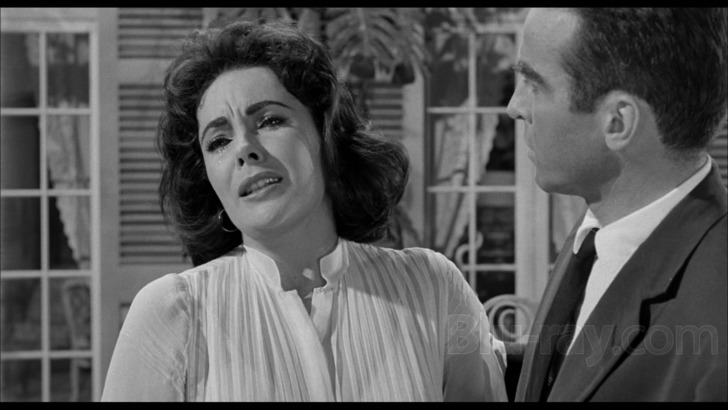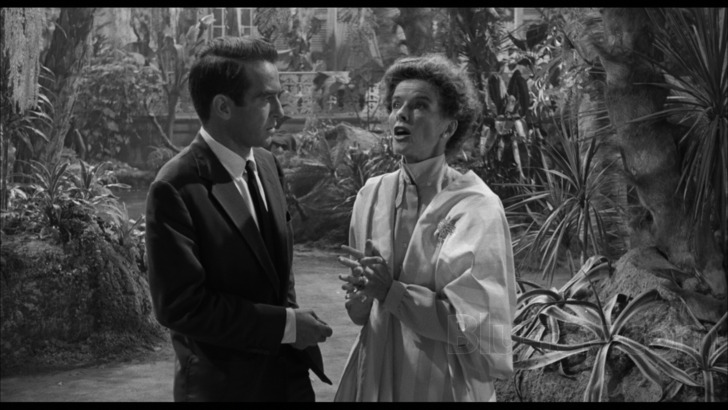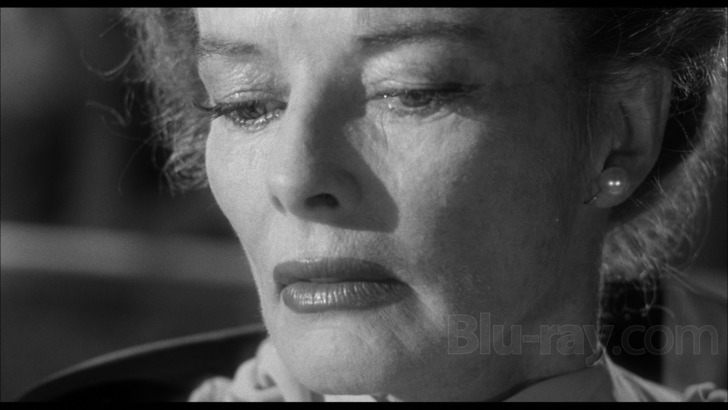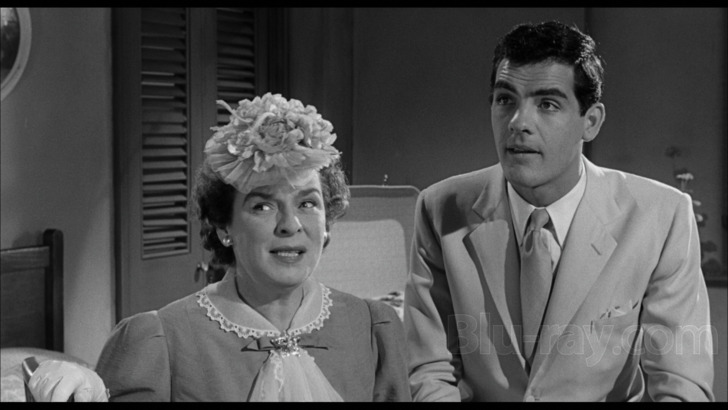Suddenly, Last Summer Blu-ray Movie
HomeSuddenly, Last Summer Blu-ray Movie 
Limited Edition to 3000Twilight Time | 1959 | 114 min | Not rated | Aug 15, 2017

Movie rating
7.3 | / 10 |
Blu-ray rating
| Users | 5.0 | |
| Reviewer | 4.0 | |
| Overall | 4.0 |
Overview
Suddenly, Last Summer (1959)
After witnessing her cousin's death, Catherine Holly begins to suffer mental problems. Her aunt, Violet Venable attempts to persuade neurosurgeon Dr Cukrowicz to perform a lobotomy in order to put an end to Catherine's hallucinations and the truth coming out about her son's death.
Starring: Elizabeth Taylor, Katharine Hepburn, Montgomery Clift, Albert Dekker, Mercedes McCambridgeDirector: Joseph L. Mankiewicz
| Drama | Uncertain |
| Thriller | Uncertain |
| Mystery | Uncertain |
Specifications
Video
Video codec: MPEG-4 AVC
Video resolution: 1080p
Aspect ratio: 1.85:1
Original aspect ratio: 1.85:1
Audio
English: DTS-HD Master Audio 2.0 Mono (48kHz, 24-bit)
Music: DTS-HD Master Audio 2.0 (48kHz, 24-bit)
Subtitles
English SDH
Discs
Blu-ray Disc
Single disc (1 BD)
Playback
Region free
Review
Rating summary
| Movie | 4.0 | |
| Video | 5.0 | |
| Audio | 4.0 | |
| Extras | 1.5 | |
| Overall | 4.0 |
Suddenly, Last Summer Blu-ray Movie Review
Reviewed by Jeffrey Kauffman January 21, 2022Two rather notable American families had their lives upended by the supposed "miracle cure" of lobotomy in the 1940s, not necessarily in the same way (I'll mention a third example in my closing comments, below, since it differs in some material aspects). Kind of weirdly, though, both of the families had young women with Rose in their names, Rosemary Kennedy, daughter of Joseph P. and Rose, and Rose Williams, sister of Tennessee Williams. Rosemary was lobotomized in 1941 and Rose was lobotomized in 1943, and neither of them made it through the surgery intact. The Kennedy fortune helped to keep the actual devastating effects on Rosemary of the now largely discredited technique "containable", though it was up to Tennessee Williams himself to try to keep Rose in as much comfort as possible after her operation, and several biographers of Williams have gone on record stating that those travails actually led to several of Williams' own less than helpful behaviors, including use of alcohol and drugs. The threat of lobotomy underpins much of Suddenly, Last Summer, a 1959 film version of a Williams one act that had been aggregated with another one act by Williams for an off Broadway excursion called Garden District (a reference to the New Orleans neighborhood where both stories took place) which opened in January of 1958 (with the only cast member that most rank and file movie fans would recognize being Robert Lansing, who played the role essayed by Montgomery Clift in this film version). Kind of ironically, given Williams' notoriety as what might in current parlance be called a Gay Icon, while homosexuality is predictably also a subtext in Suddenly, Last Summer, it's not that perceived "perversion" that raises the specter of having a brain invaded and severed, but instead a refraction, in a manner of speaking, of one character's gayness and ramifications experienced by another character that leads to a showdown as to how best treat a supposed "mental illness".

The film opens with a vision of an imposing brick edifice as the credits play out, with a pan finally revealing that the wall belongs to a state mental institution. Dr. Lawrence J. Hockstader (Albert Dekker), the facility's leader, is in the operating theater, excitedly informing interns they're about to witness the groundbreaking new procedure of lobotomy, which is to be performed on a patient by Hockstader's acolyte, Dr. John Cukrowicz (Montgomery Clift). Cukrowicz does in fact complete the procedure, though under less than optimal conditions, since the state hospital is more than inadequately funded, and "little" things like the electricity going off hamper the situation. In a post surgical showdown, Cukrowicz more or less states he can't continue under such circumstances, but Hockstader informs him a veritable deus ex machina has shown up in the form of local doyenne Violet Venable (Katharine Hepburn), who has money to burn and wants to see Hockstader as soon as possible toward some as yet unknown end, which Violet has nonetheless deemed "urgent".
Cukrowicz journeys to the Venable mansion, where Violet makes an imposing entrance by descending in an elevator, actually kind of like a god(dess) coming down from the skies to interact with "mere" mortals. The ensuing scene includes a lot of typical flowery Williams speechifyin' (by way of an adapted screenplay by Gore Vidal), with the upshot being that Violet wants to hire Cukrowicz to treat her supposedly addled niece, Catherine (Elizabeth Taylor), who has been consigned to an asylum run by nuns, but whose outbursts have made her unwelcome at the facility. Weirdly, while Catherine seems to be the reason Violet summoned Cukrowicz to her side, Violet actually spends most of their initial interchange reminiscing about her deceased son Sebastian, whose death seems to be at least partially to blame for Catherine's instability. Violet seems intent on "giving" (what a weird use of that term) Catherine a lobotomy to quell her "insanity", but first, of course, Cukrowicz wants to meet Catherine himself.
Suffice it to say that all is not as it seems, or at least as Violet has portrayed it to be, and a long second act slowly peels back the layers of some Venable family history, which includes more than one "injury" to Catherine. Sebastian's homosexuality is alluded to rather interestingly for a 1959 production, and it is in fact his desire to attract young men that has in its own way ensnared both Violet and Catherine. Violet wants Cukrowicz to "cut out" Catherine's "babbling", while Cukrowicz actually wants Catherine to "babble", or at least talk, setting up a central conflict of the story. But as with virtually all Williams pieces, there's a lot to unpack here, including ideas surrounding motherhood (note how the patient lobotomized in the first scene had been playing with a doll in a quasi-mothering fashion), what might be termed "codependence" with a gay character, and the very real debate about how best to deal with emotional and/or "mental" illness.
That all comes to a head when Cukrowicz gives Catherine a kind of sodium pentothol type drug and certain elements which have been alluded to via such plot devices as a Venus Flytrap Violet keeps in a garden designed by Sebastian reach (pun unavoidable) full flower, including a perhaps questionable and hyperbolic assertion of cannibalism. (There are also repeated sightings of flypaper in the film and a clear indication that at least Catherine has been a kind of "bait" utilized by Sebastian, in perhaps more forced symbolic tethers.) It's this really provocative and seemingly outrageous aspect which may chafe at some viewers' sensibilities of what is supposed to be a "realistic" story, but it's a plot (and presentational) element which is positively ripe for, well, analysis.
Suddenly, Last Summer Blu-ray Movie, Video Quality 

Suddenly, Last Summer is presented on Blu-ray with an AVC encoded 1080p transfer in 1.85:1. This is another stellar effort from the almost always reliable curators of the Sony - Columbia catalog. Detail levels are uniformly excellent throughout the presentation, with the possible understandable exception of the "dream" sequence toward the end, where a surplus of optical effects leads to a slight diminution of overall detail and fine detail in particular. Otherwise, though, this offers superb accounts of everything from the textures of fabrics on costumes to some of the lush foliage in Sebastian's overgrown garden. Close-ups offer really substantial detail levels almost all of the time (see screenshot 3 for just one example). Contrast is consistent throughout, with solid black levels and really lustrous grayscale. Grain resolves naturally and I noticed no compression anomalies and no huge signs of age related wear and tear.
Suddenly, Last Summer Blu-ray Movie, Audio Quality 

Suddenly, Last Summer features a DTS-HD Master Audio Mono track which provides more than capable support for this very talk heavy film. Those with an interest in American composers may know that Ned Rorem evidently provided the score for the original off Broadway version, but here it's an amalgam of work from Malcolm Arnold and Buxton Orr, with some cues being a bit on the overwrought side, but sounding full bodied and problem free on the track. Dialogue is always rendered cleanly and clearly throughout. Optional English subtitles are available.
Suddenly, Last Summer Blu-ray Movie, Special Features and Extras 

- Original Theatrical Trailer (HD; 2:51)
- Isolated Score and Effects Track is presented in DTS-HD Master Audio 2.0 and is accessible under the Setup Menu.
Suddenly, Last Summer Blu-ray Movie, Overall Score and Recommendation 

Longtime readers of my reviews may know that I achieved whatever bona fides in film historical research I may have (and I'm not claiming to have any, just to be clear) for my deconstruction of the Frances Farmer story, especially as it was portrayed in a novel and the Jessica Lange feature film about Farmer, both of which feature a rather horrifying transorbital lobotomy performed on her, one for which there is absolutely no positive evidence, either circumstantial or otherwise. It's kind of curious that, having gotten to know various Farmer family members through the years, they've had to endure a kind of similar sorrow that I'm sure members of the Kennedy and Williams families had to, even if their beloved relative was still (more or less?) intact after institutionalization, as if to suggest that even the mere mention of a potential lobotomy can be absolutely damaging (and understandably so). You can feel Tennessee Williams' pain almost oozing from various scenes in this film, though the whole Grand Guignol denouement may undercut Williams' nobler tendencies, which might be summed up with an "if only Rose had received a 'talking cure'". Gore Vidal may be faulted for trying to expand an evidently pretty compact one act into a feature film, but this offers a trio of true "star performances" from Clift (who kind of interestingly would soon go on to portray Freud ), Taylor and Hepburn (the latter two of whom received Academy Award nominations for their performances). Technical merits are solid, and Suddenly, Last Summer comes Recommended.
Similar titles
Similar titles you might also like

Secret Ceremony
1968

Through a Glass Darkly
Såsom i en spegel
1961

The Magician
Ansiktet
1958

Wake in Fright
1971

Secret Beyond the Door
4K Restoration
1947

Track 29
1988

The Comfort of Strangers
1990

Equus
1977

Bigger Than Life
1956

First Reformed
2017

Sharp Objects
2018

Viridiana 4K
1961

Under the Sand
Sous le sable
2000

Krisha
Signed Limited Edition to 100 Copies - SOLD OUT
2015

Madeline's Madeline
2018

Burning
버닝 / Beoning
2018

The Forbidden Room
2015

The Silence
Tystnaden
1963

The Passion of Anna
En passion
1969

The Seventh Victim 4K
1943
